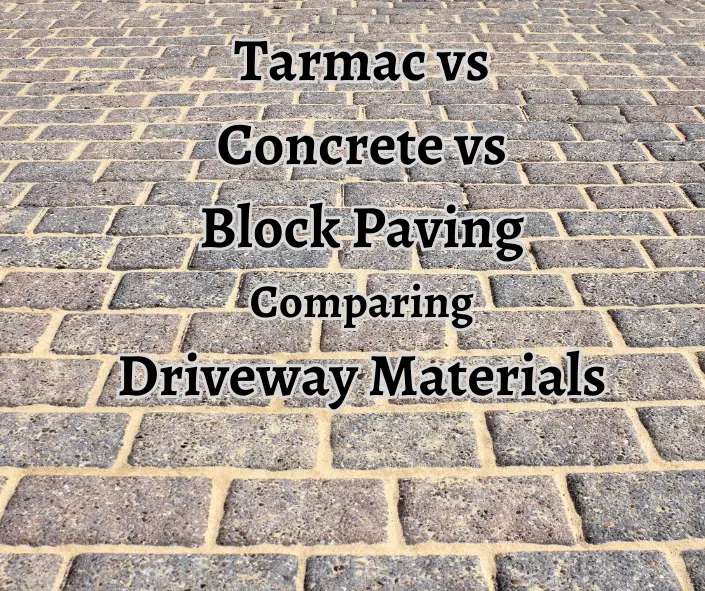Selecting the right driveway material is crucial for several reasons. Tarmac vs. Concrete vs. Block Paving. Comparing Driveway Materials
The appropriate choice can enhance your property’s curb appeal and value, ensuring the investment pays off in the long run.
Additionally, the right material contributes to the driveway’s durability and longevity, reducing the need for frequent repairs or replacements.
Finally, considering maintenance requirements is essential, as different materials demand varying levels of upkeep.
In this comparison, we will introduce three popular driveway materials
- Tarmac: A smooth, durable surface made from a blend of tar and crushed stone, offering cost-effectiveness and relatively easy installation.
- Concrete: A strong and long-lasting material that can be customized in terms of appearance but may require more extensive installation and a higher initial cost.
- Block paving: A versatile and aesthetically pleasing option made from individual blocks, allowing for a wide range of designs but potentially demanding more maintenance over time.
Tarmac Driveways Pros
- Cost-effective and affordable: Tarmac is known for being a budget-friendly option compared to other driveway materials.
- Quick and easy installation process: Tarmac driveways can typically be installed within a day, making it a convenient choice for homeowners looking for a fast solution.
- Durable and weather-resistant: Tarmac is a robust material that can withstand various weather conditions, including storms, hail, and ice.
- Smooth surface providing skid resistance: The smooth finish of a tarmac driveway offers excellent traction, reducing the risk of skidding and making it safer for both vehicles and pedestrians.
Tarmac Driveways Cons
- Limited design options and colors: Tarmac driveways generally come in a limited range of colors, primarily black or dark gray, and offer fewer design options compared to other materials like block paving or stamped concrete.
- May require periodic maintenance and repairs: While tarmac is durable, it can develop cracks and potholes over time, requiring periodic repairs to maintain its appearance and functionality.
- Can soften and fade over time due to exposure to high temperatures: Prolonged exposure to high temperatures, especially during hot summer months, can cause tarmac to soften and lose its original color, leading to a faded and less attractive appearance.
Concrete Driveways Pros
- Versatile design options: Concrete driveways offer a wide variety of design options, including colors, textures, and patterns, making it easier for homeowners to customize their driveway to match their preferences and the aesthetics of their home.
- Durability and strength: Concrete driveways are known for their strength and durability, making them a long-lasting choice for homeowners who want a low-maintenance option.
- Low maintenance: Concrete driveways require minimal maintenance, as they do not need to be resealed as frequently as some other materials, like tarmac.
- Resistant to staining and oil leaks: Concrete driveways can be treated with a sealer to make them resistant to staining from oil leaks and other spills, helping to maintain their appearance over time.
Concrete Driveways Cons
- Higher initial cost: Concrete driveways generally have a higher initial cost compared to tarmac driveways, as the material and installation process can be more expensive.
- Longer installation time: Installing a concrete driveway often takes longer than a tarmac driveway due to the time required for the concrete to set and cure properly.
- Susceptible to cracking: Concrete driveways can develop cracks over time, particularly in areas with frequent freeze-thaw cycles. Although cracks can be repaired, they may still be visible after repair, affecting the driveway’s appearance.
- May require sealing: To maintain its appearance and prevent staining, a concrete driveway may need to be sealed periodically, adding to the overall maintenance cost.
- Can be slippery when wet: Concrete driveways can become slippery when wet, especially if they have a smooth finish. This may pose a safety risk, particularly in areas with frequent rain or snow.
Block Paving Driveways Pros
- Aesthetically appealing: Block paving driveways offer a wide range of design possibilities with various colors, shapes, and patterns, allowing homeowners to create a unique and visually appealing driveway.
- Easy to repair: If a block becomes damaged or stained, it can be easily replaced without affecting the surrounding blocks. This makes repairs more straightforward and cost-effective compared to other driveway materials.
- Permeable options: Permeable block paving options allow water to drain through the surface, reducing the risk of flooding and helping to manage stormwater runoff.
- Long-lasting: When properly installed and maintained, block paving driveways can last for many years, providing a durable and reliable driveway solution.
- Increased property value: The aesthetic appeal and durability of block paving driveways can help increase the property value and curb appeal of your home.
Block Paving Driveways Cons
- Higher initial cost: Block paving driveways generally have a higher initial cost compared to tarmac and concrete driveways due to the materials and labor involved in the installation process.
- Time-consuming installation: The installation of block paving driveways can be more time-consuming than tarmac or concrete driveways, as each block needs to be individually placed and aligned.
- Regular maintenance required: Block paving driveways may require more regular maintenance, such as cleaning and sealing, to maintain their appearance and prevent weed growth and moss buildup.
- Potential for uneven settling: Over time, block paving driveways can experience uneven settling if the base is not properly prepared, leading to an uneven surface and potential tripping hazards.
- Vulnerable to staining: Block paving driveways can be more susceptible to staining from oil spills, rubber marks, or other contaminants, requiring regular cleaning to maintain their appearance.
Which is Cheaper Tarmac vs. Concrete vs. Block Paving
Tarmac is generally cheaper than concrete and block paving. In general terms, a tarmac driveway costs between £80 per square meter, while a concrete driveway costs around £90 per m2. Block paving driveways tend to be more expensive than both tarmac and concrete due to the material and labor costs involved in the installation process. However, it’s essential to consider factors beyond cost, such as durability, maintenance requirements, and aesthetic appeal when selecting a driveway material.
If you want to work out the price of a new driveway use our driveway cost calculator
Conclusion
It is essential to understand the key differences between tarmac, concrete, and block paving driveways when deciding on the most suitable material for your needs.
Each material comes with its own set of pros and cons, and your choice will ultimately depend on factors such as budget, design preferences, and maintenance requirements.
Tarmac driveways are cost-effective and quick to install, but they may require periodic maintenance and offer limited design options.
Concrete driveways, on the other hand, are strong and long-lasting with a wide range of design options, but they can be more expensive and prone to cracking.
Block paving driveways offer great design flexibility and visual appeal, but they require regular maintenance and can be more expensive and time-consuming to install.
It is crucial to weigh the advantages and disadvantages of each material based on your specific needs and preferences.
Consulting with professionals and obtaining expert advice and guidance can help you make an informed decision on the most suitable driveway material for your property.
By carefully considering your options and investing in the right driveway material, you can enhance the curb appeal and functionality of your home for years to come.
Author Profile

- I have many qualifications and certificates in construction, such as City & Guilds, CPCS and CITB. These are the highest standards of training and competence in the industry. Whether you need help with plumbing, carpentry, bricklaying or any other trade, I’m here to help you succeed.
Latest entries
- March 6, 2024CalculatorsWall Tile Calculator: How Many Wall Tiles Do You Need
- February 29, 2024Roof Truss Cost Calculator
- December 31, 2023Wage Take Home Calculator
- December 30, 2023Day Rate Calculator

